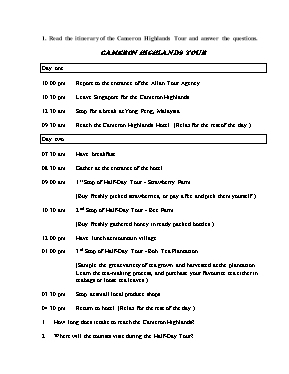Bài tập Unit 8 môn Tiếng Anh Lớp 9 - Phần đọc
Bạn đang xem tài liệu "Bài tập Unit 8 môn Tiếng Anh Lớp 9 - Phần đọc", để tải tài liệu gốc về máy bạn click vào nút DOWNLOAD ở trên

1. Read the itinerary of the Cameron Highlands Tour and answer the questions. Cameron Highlands Tour Day one 10.00 pm Report to the entrance of the Allan Tour Agency. 10.30 pm Leave Singapore for the Cameron Highlands. 12.30 am Stop for a break at Yong Peng, Malaysia. 09.30 am Reach the Cameron Highlands Hotel. (Relax for the rest of the day.) Day two 07.30 am Have breakfast. 08.30 am Gather at the entrance of the hotel. 09.00 am 1st Stop of Half-Day Tour - Strawberry Farm. (Buy freshly picked strawberries, or pay a fee and pick them yourself.) 10.30 am 2nd Stop of Half-Day Tour - Bee Farm. (Buy freshly gathered honey in ready packed bottles.) 12.00 pm Have lunch at mountain village. 01.00 pm 3rd Stop of Half-Day Tour - Boh Tea Plantation. (Sample the great variety of tea grown and harvested at the plantation. Learn the tea-making process, and purchase your favourite tea either in teabags or loose tea leaves.) 03.30 pm Stop at small local produce shops. 04.30 pm Return to hotel. (Relax for the rest of the day.) 1. How long does it take to reach the Cameron Highlands? 2. Where will the tourists visit during the Half-Day Tour? 3. What must the tourists do if they want to pick their own strawberries at the Strawberry Farm? 4. What can the tourists do at the Boh Tea Plantation? 5. What does ‘local produce’ in this itinerary mean? 2. Read the conversation and answer the questions True or False. Nick: Vova, I hear that you took the train across Russia. Vova: Yes, I started in Moscow, travelled all through Russia and Mongolia, and ended up in China. Nick: Wow! That's a long way! Vova: Yes. It took three weeks. I did it as part of a tour with ten other people. Nick: Cool! What was the landscape like? Vova: A lot of it was flat and you could see that there was absolutely nothing for miles. As we got into Siberia there were scattered trees, and when we got into Mongolia we could see some camels, but besides that there was next to nothing. Nick: Wow! Wild camels! So how did you eat on this train? Vova: We stopped several times at stations along the way and on every platform you could buy local food. Every train had hot water on it too, so you could always make noodles if you were desperate. Nick: Wow! Would you do it again? Vova: Great question! Yes, I would do it again, but I would wait several years to do it! There are so many other things to do and see. Nick: OK. Thanks a lot. 1. Vova had a two-week train journey to China. 2. The train went past three countries. 3. There were ten people in his tour. 4. The landscape was flat there. 5. They could only eat noodles on the station platforms. 6. Vova would take another train soon. 3. Read the text below and decide which option (A, B, C, or D) best fits each space. The tourist industry is considered to be the world's largest industry. The direct (1)________ impact of the industry, including accommodation, transportation, entertainment, and attractions, is worth trillions of dollars every year. The statistics show that the number of international tourist (2)________worldwide reached 1.04 billion in 2012. Such large (3)________ of tourists, however, are beginning to cause problems. For example, in the Alps the many thousands of skiers are (4)________ the mountains they came to enjoy. Even parts of Mount Everest in the Himalayas are reported to be covered (5)________ old food tins, tents, and pieces of equipment that have been (6) ________ away. At a time when we have greater freedom to travel (7)________ ever before, more and more people are asking how they can enjoy their holidays (8) ________ causing damage to their destinations. Now there is a new holiday guide (9) ________ Holidays That Don't Cost the Earth. It tells you how you can be a responsible tourist by asking your travel agent or your tour (10) ________ the right questions before you book a holiday. 1. A. national B. educational C. economic D. cultural 2. A. arrivals B. deliveries C. comings D. figures 3. A. totals B. numbers C. amounts D. digits 4. A. bending B. destroying C. fixing D. hurting 5. A. for B. on C. with D. below 6. A. put B. tidied C. given D. thrown 7. A. than B. when C then D. while 8. A. outside B. instead C. beside D. without 9. A. called B. known C termed D. described 10. A. advisor B. director C. operator D. worker
Tài liệu đính kèm:
 bai_tap_unit_8_mon_tieng_anh_lop_9_phan_doc.doc
bai_tap_unit_8_mon_tieng_anh_lop_9_phan_doc.doc





